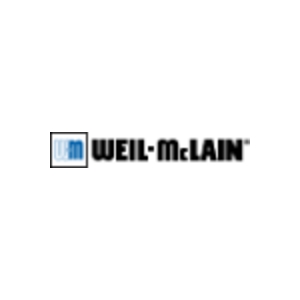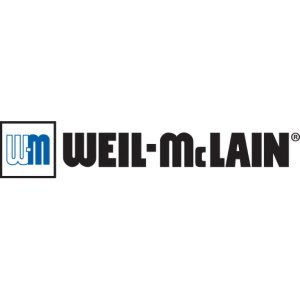Weil-McLain - Experts & Thought Leaders
Latest Weil-McLain news & announcements
Weil-McLain®, a pioneer in hydronic comfort heating solutions, introduces the ECO™ HP Air-to-Water Heat Pump, a cutting-edge electric heat pump designed for residential and light commercial applications. This new system is a key component of the ECO™ Hybrid Dual-Fuel Hydronic System, combining the efficiency of a heat pump with the reliability of a traditional gas boiler to deliver superior energy-efficient gains, consistent comfort, year-round domestic hot water capabilities and reduced carbon emissions. hybrid dual-fuel hydronic system ECO HP operates efficiently in milder temperatures, seamlessly transitioning to the boiler during cold The ECO HP operates efficiently in milder temperatures, seamlessly transitioning to the boiler during extreme cold to ensure consistent warmth, hot water production and reduced energy consumption year-round. “This hybrid dual-fuel hydronic system is engineered to provide the best of both worlds – utilizing the heat pump’s high efficiency and decarbonization potential while leveraging the boiler’s dependability as a backup when needed,” said Elliott Willey, Director of Product Management & Climate Conscious with Weil-McLain. “By integrating this hybrid system, homeowners can reduce their carbon footprint and increase their overall system efficiency to support a more sustainable future.” integrating the ECO HP within a traditional gas boiler The ECO Hybrid System redefines home heating by integrating the ECO HP within a traditional gas boiler hydronic heating system, providing an adaptable, dual-fuel solution. This setup ensures homes remain warm even in the coldest climates by leveraging the heat pump’s efficiency during milder temperatures and the boiler’s reliability as a backup. The hybrid approach not only extends the life expectancy of both appliances but also offers significant energy savings, making it a budget-friendly and environmentally conscious choice. The ECO Hybrid System Weil-McLain understands that useful installation is crucial for homeowners and contractors Weil-McLain understands that practical installation is crucial for both homeowners and contractors. The ECO Hybrid System is designed for flexibility, allowing for phased installation, which is especially beneficial when replacing a failed boiler in the cold of winter. “We designed the ECO Hybrid System for phased installation, allowing contractors to quickly restore heat with a heat-pump-ready boiler during winter, and add the outdoor heat pump in warmer months to maximize efficiency without interrupting home comfort,” said Willey. Unparalleled Efficiency and Quiet Operation Engineered with noise reduction technology, the ECO HP operates at a quiet sound due to a bionic fan design and enhancements in its twin-rotor compressor. These features make it ideal for residential settings where noise reduction is a priority. Unlike forced-air heating systems that distribute heat through the air, the ECO HP uses hot water in a closed-loop system to provide radiant and convective heat, offering improved indoor air quality by reducing the spread of dust, allergens, and airborne pollutants. This approach enhances comfort and health by maintaining a cleaner indoor environment. Reliable and energy-efficient solution ECO HP is designed to deliver domestic hot water year-round, providing a reliable and energy-efficient In addition to heating, the ECO HP is designed to deliver domestic hot water year-round, providing a reliable and energy-efficient solution for all seasons. This ensures homeowners benefit from a consistent hot water supply while optimizing energy use, even during peak demand periods. As part of the dual-fuel solution, the ECO HP ensures consistent comfort, extends equipment life expectancy and delivers significant energy savings across all climates. Eco-friendly R32 refrigerant The system operates with an eco-friendly R32 refrigerant, offering up to three times greater efficiency compared to traditional heating methods. To optimize these benefits, Weil-McLain has developed the ECO Calc Application Sizing Tool. This innovative tool aids in properly sizing the application by analyzing data on the home’s heating load, heat pump capacity, localized weather data and utility rates and more, ensuring the system performs at its best in every installation.
Weil-McLain®, a trusted name in hydronic comfort heating systems for over a century, announces a rebranding initiative that reflects its commitment to customers, a legacy of dependability and a vision for the future of hydronics. Launching at the 2025 AHR Expo, the world’s largest HVAC trade show, the refreshed brand highlights Weil-McLain’s focus on high-efficiency, climate-conscious advancements and aligns with the global strength of its parent company, SPX Technologies, Inc. Reliable boiler systems “For more than 100 years, Weil-McLain has been synonymous with reliable boiler systems and a contractor-first approach, but it has evolved way beyond that over the past ten years,” said Mike Doohry, Vice President and General Manager of WM Technologies, LLC. “Our rebranding represents more than a new look – it’s a statement of our dedication to innovation, sustainability, and advancing the hydronics industry alongside SPX Technologies. Unveiling this transformation at the AHR Expo signals our evolution as a company ready to lead the industry into a new era.” A Fresh Look with a Legacy of Excellence The rebranding initiative raises a sleek and modern visual identity that closely aligns with SPX Technologies The rebranding initiative introduces a sleek and modern visual identity that closely aligns with SPX Technologies. This updated brand logo underscores Weil-McLain’s standing as a pioneer in hydronics and strengthens its connection to SPX’s HVAC segment and heating platform. “As the industry shifts to meet the growing demand for energy-efficient and carbon-conscious solutions, now is an ideal time for Weil-McLain to refresh its industry-pioneering brand,” said Doohry. “The new identity reflects our unwavering commitment to providing products that meet the needs of an ever-changing world while honoring the heritage and quality that have defined the brand for generations.” Hydronic comfort heating systems The brand modernization reaffirms the company's dedication to delivering sustainable hydronic comfort heating systems for residential, commercial, and institutional buildings. Backed by SPX Technologies and the business synergies within its HVAC platform, the Weil-McLain brand is poised to expand and grow its portfolio of high-quality, energy-efficient products. Benefits of future generations Customers and partners can continue to rely on the company’s legacy of excellence while benefiting from its future-focused and cutting-edge hydronic heating product advancements. “We’re raising the bar on efficiency, reliability, and sustainability,” said Doohry. “Our thoughtfully designed products simplify installation, operation, and maintenance, while pioneering climate-conscious solutions that will benefit future generations.”
Weil-McLain® has launched its latest promotion, offering contractors two chances to win big this heating season. Contractors who purchase residential high-efficiency boilers from an authorized Weil-McLain distributor can earn valuable rewards. Those who register and install the units can unlock even more incentives. Additionally, by joining The Weil-McLain Advantage™ program during the 2024 Double Down, Double Chance promotion, contractors can compete for regional prizes, including a grand prize. Weil-McLain Advantage™ program These promotions include the following incentives: Deal #1 – Get Geared Up (Now through November 30, 2024): Contractors who purchase five high-efficiency boilers will receive a Carhartt® jacket (valued at $150) and a certificate they can redeem for a Parts Kit of their choice (up to $2,200 in value) by uploading a copy of their proof of purchase on the website. New and existing members of The Weil-McLain Advantage™ Program can earn an additional Carhartt jacket by installing and registering the five purchased boilers. This promotion runs until November 30, 2024. Deal #2 – Compete to Win (Now through December 31, 2024): The contractor who registers the most boilers among those individuals will receive the grand prize New and existing members of The Weil-McLain Advantage Program who install and register the most high-efficiency condensing boilers during the promotion period, which runs until December 31, 2024, will win an ECO® Tec Series 2 199-C High-Efficiency Combi Boiler (valued at $5,000). One boiler will be awarded to the top performer in each sales region – West, Central, Mid-Atlantic, New York/New Jersey, and New England – and the contractor who registers the most boilers amongst those individuals will receive the grand prize of ten co-branded Carhartt jackets (valued at $1,500). Winners will be announced by January 31, 2025. heating solutions “Contractors are the backbone of our industry, and these promotions both express our gratitude for their ongoing trust and support of Weil-McLain and reinforce our commitment to their success,” said Mike Langen, Director of Sales for Weil-McLain. Mike Langen adds, “Our high-efficiency residential boilers offer a full line of breadth and quality, and with this promotion, contractors can further boost their rewards while delivering top-tier heating solutions to their customers. We’re excited to see who will take home the top prizes!”
Insights & Opinions from thought leaders at Weil-McLain
Hybrid heating systems are becoming more and more common today as building owners, engineers and facility managers seek ways to reduce heating costs in both current facilities and new builds. Combining a large mass, non-condensing boiler with a high efficiency-condensing boiler – or “hybrid system” – ensures that a heating system is running at optimum efficiency to minimize operating costs over the course of a heating season. Why do condensing and non-condensing boilers make such a good pair? Non-condensing boilers are ideal for the core heating season months of December through February. That’s because these boilers are designed to run at higher return water temperatures above 130 degrees to maximize longevity. The average efficiencies of non-condensing boilers, such as cast iron boilers, range from 80-85 percent thermal efficiency. Condensing and non-condensing boilers Running condensing boilers in high return temperature applications reduces their operating efficiency In comparison, condensing boilers reach their maximum efficiency – upwards of 95 percent –when the return water temperature is below dew point and are ideal for operation during the milder heating season shoulder months of October, November, March and April. Running condensing boilers in high return temperature applications reduces their operating efficiency to marginally higher than non-condensing boiler designs. By combining non-condensing and condensing boilers in a hybrid system boiler plant, users can reset building set points, reduce fuel consumption to lower operating costs and create comfortable, consistent building temperatures throughout the heating season. Hybrid boiler systems So why not just use an all high efficiency boiler plant? Consider the following benefits of a hybrid boiler system: Boiler Replacement Applications: Installing a hybrid system makes sense in existing, non-condensing replacement boiler applications. Most often, there are at least two high mass, non-condensing boilers in older boiler plants. Installing a high efficiency, condensing boiler in place of one of the failing high mass boilers now enables the efficiency benefits of the hybrid system. Further, this approach enables an incremental step in financing the overall boiler replacement capital outlay over time. New Build Applications: In short, condensing boilers cost more - upwards of 30-40 percent more than non-condensing boiler systems because of the non-corrosive heat exchanger materials required. Installing a hybrid system is more cost effective to purchase upfront and often achieves the greater portion of the energy savings of replacing an entire boiler plant with high-efficiency condensing boilers. Product Life / Longevity: Inherent to their design, non-condensing boilers have a longer product life, up to two times that of condensing boiler designs because of their thicker cast iron design and wider water pathways. Installing a hybrid system ensures a longer life of the boiler plant dedicated to the coldest heating season months. Hybrid heating systems are becoming more and more common today Multiple industries Consider an elementary school with two large cast iron boilers – one of which needs to be replaced after many years of dependable operation. In this scenario, the cast iron boiler is replaced with a new, high efficiency condensing boiler to match the heating requirement. A hybrid system can be utilized in many facilities across multiple industriesOnce installed, the condensing boiler controller allows for the assignment of an alternating, lead/lag boiler plant so that it serves as the primary boiler over the milder heating season months and the existing non-condensing boiler is operational more for colder days. A hybrid system can be utilized in many facilities across multiple industries. More frequently, commercial buildings such as medical facilities, apartment complexes, churches, schools, colleges, nursing homes and corporate campuses, are standardizing on hybrid system boiler designs. Combining a durable cast iron boiler with a high efficiency condensing boiler can reduce wasted energy, lower utility costs and protect the environment with a smaller carbon footprint, while extending the life of the existing heating system at a lower acquisition cost.
From A To L: Your A2L Transition Guide
DownloadLeveraging Radiant And Hydronics To Help Achieve Decarbonization Goals
DownloadSealed Connectors In Harsh Environments
DownloadPowering And Cooling Next Generation Data Centers
DownloadDebunking Myths To Promote A Bright Future For Heat Pumps
Download

















